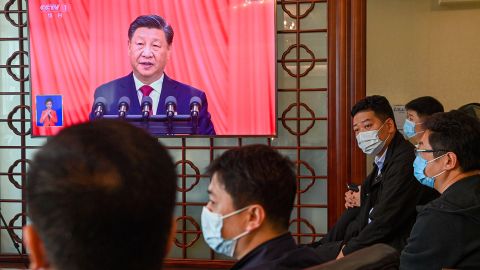Hong Kong
CNN Business
—
Hong Kong stocks had their worst day since the 2008 global financial crisis, just a day after Chinese leader Xi Jinping secured his iron grip on power at a major political gathering.
Foreign investors spooked by the outcome of the Communist Party’s leadership reshuffle dumped Chinese equities and the yuan despite the release of stronger-than-expected GDP data. They’re worried that Xi’s tightening grip on power will lead to the continuation of Beijing’s existing policies and further dent the economy.
Hong Kong’s benchmark Hang Seng
(HSI) Index plunged 6.4% on Monday, marking its biggest daily drop since November 2008. The index closed at its lowest level since April 2009.
The Chinese yuan weakened sharply, hitting a fresh 14-year low against the US dollar on the onshore market. On the offshore market, where it can trade more freely, the currency tumbled 0.8%, hovering near its weakest level on record, even as the Chinese economy grew 3.9% in the third quarter from a year ago, according to the National Bureau of Statistics. Economists polled by Reuters had expected growth of 3.4%.
The sharp sell-off came one day after the ruling Communist Party unveiled its new leadership for the next five years. In addition to securing an unprecedented third term as party chief, Xi packed his new leadership team with staunch loyalists.
A number of senior officials who have backed market reforms and opening up the economy were missing from the new top team, stirring concerns about the future direction of the country and its relations with the United States. Those pushed aside included Premier Li Keqiang, Vice Premier Liu He, and central bank governor Yi Gang.
“It appears that the leadership reshuffle spooked foreign investors to offload their Chinese investment, sparking heavy sell-offs in Hong Kong-listed Chinese equities,” said Ken Cheung, chief Asian forex strategist at Mizuho bank.

The GDP data marked a pick-up from the 0.4% increase in the second quarter, when China’s economy was battered by widespread Covid lockdowns. Shanghai, the nation’s financial center and a key global trade hub, was shut down for two months in April and May. But the growth rate was still below the annual official target that the government set earlier this year.
“The outlook remains gloomy,” said Julian Evans-Pritchard, senior China economist for Capital Economics, in a research report on Monday.
“There is no prospect of China lifting its zero-Covid policy in the near future, and we don’t expect any meaningful relaxation before 2024,” he added.
Coupled with a further weakening in the global economy and a persistent slump in China’s real estate, all the headwinds will continue to pressure the Chinese economy, he said.
Evans-Pritchard expected China’s official GDP to grow by only 2.5% this year and by 3.5% in 2023.
Monday’s GDP data were initially scheduled for release on October 18 during the Chinese Communist Party’s congress, but were postponed without explanation.
The possibility that policies such as zero-Covid, which has resulted in sweeping lockdowns to contain the virus, and “Common Prosperity” — Xi’s bid to redistribute wealth — could be escalated was causing concern, Cheung said.
“With the Politburo Standing Committee composed of President Xi’s close allies, market participants read the implications as President Xi’s power consolidation and the policy continuation,” he added.
Mitul Kotecha, head of emerging markets strategy at TD Securities, also pointed out that the disappearance of pro-reform officials from the new leadership bodes ill for the future of China’s private sector.
“The departure of perceived pro-stimulus officials and reformers from the Politburo Standing Committee and replacement with allies of Xi, suggests that ‘Common Prosperity’ will be the overriding push of officials,” Kotecha said.
Under the banner of the “Common Prosperity” campaign, Beijing launched a sweeping crackdown on the country’s private enterprise, which shook almost every industry to its core.
“The [market] reaction in our view is consistent with the reduced prospects of significant stimulus or changes to zero-Covid policy. Overall, prospects of a re-acceleration of growth are limited,” Kotecha said.
On the tightly controlled domestic market in China, the benchmark Shanghai Composite Index dropped 2%. The tech-heavy Shenzhen Component Index lost 2.1%.
The Hang Seng Tech Index, which tracks the 30 largest technology firms listed in Hong Kong, plunged 9.7%.
Shares of Alibaba
(BABA) and Tencent
(TCEHY) — the crown jewels of China’s technology sector — both plummeted more than 11%, wiping a combined $54 billion off their stock market value.
The sell-off spilled over into the United States as well. Shares of Alibaba and several other leading Chinese stocks trading in New York, such as EV companies Nio
(NIO) and Xpeng, Alibaba rivals JD.com
(JD) and Pinduoduo
(PDD) and search engine Baidu
(BIDU), were all down sharply Thursday afternoon.

